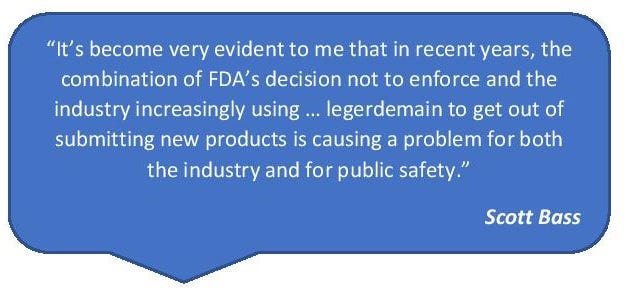Sweeping changes proposed to dietary supplement notification system
Scott Bass, an attorney in the nation's capital who helped draft DSHEA, and Massachusetts physician Pieter Cohen have proposed requiring manufacturers submit the vast majority of new dietary ingredients to FDA for safety assessments.
.png?width=850&auto=webp&quality=95&format=jpg&disable=upscale)
A paper recently published in a distinguished medical journal proposed largely eliminating an exception in the law to the requirement that manufacturers provide FDA safety documentation before marketing a new dietary ingredient in a supplement.
The co-authors of the paper in the New England Journal of Medicine (NEJM), Pieter Cohen and Scott Bass, come from different worlds.
An internist at Cambridge Health Alliance in Somerville, Massachusetts and associate professor of medicine at Harvard Medical School, Cohen has, through his scientific research, identified safety-related concerns over several different products marketed as supplements. The physician has been critical of the 25-year-old Dietary Supplement Health and Education Act of 1994 (DSHEA), questioning its adequacy to protect consumers.

An attorney in the nation’s capital who heads Sidley Austin LLP’s Global Life Sciences team, Bass helped draft the law that Cohen has critiqued. What was once a modest industry has grown more than 10-fold over the last quarter century and become more complex.
“Today, this law does not adequately protect the public,” Bass and Cohen proclaimed in the article. “Since it was written, the supplement industry has been reshaped by Internet sales and an increasingly complex global supply of new substances. What was a $[US]4 billion market in 1994 with a few thousand products has grown into a more than $40 billion market with tens of thousands of dietary supplements.”
Bass and Cohen raised particular concerns over “the risks associated with newly discovered, sophisticated and potentially potent biologic and botanical ingredients that are routinely introduced as new ingredients in supplements.”
FDA doesn’t review the vast majority of these ingredients, the authors wrote, “even though review is mandated by the new dietary ingredients provision in DSHEA.”
The proposed solution: Require manufacturers submit the vast majority of new dietary ingredients—or so-called NDIs—to FDA for its review.
“Scott Bass speaks with a certain amount of credibility here because he was in the room that negotiated DSHEA,” said Steve Mister, president and CEO of the Council for Responsible Nutrition (CRN), in an interview. “He knows what … the NDI provision was intended to do.”
‘Loophole’
The proposal from Bass and Cohen would largely gut an exception in DSHEA to the NDI notification (NDIN) requirement—what the authors described as a “loophole” that has “swallowed the law.”
DSHEA “was written with the expectation that this exemption would be used infrequently, but its language is not sufficiently clear,” the two men wrote. “The exemption was not meant to apply to new chemicals, combinations or synthetic compounds. Nonetheless, the FDA has appeared to condone the use of this loophole to permit countless substances to be introduced in the absence of submitted safety data.”
The exemption or “loophole” applies to NDIs that “have been present in the food supply as an article used for food in a form in which the food has not been chemically altered.”
One safety-related problem with the exemption—according to critics—is that manufacturers introduce a food ingredient to the market through a regulatory process that omits review by FDA. The process is known as self-GRAS (generally recognized as safe), in which a panel of experts outside FDA reach a consensus about the safety of a food ingredient.
“The loophole,” Bass and Cohen observed in their article, “has grown into the exemption that swallowed the law: Industry developed, and the FDA accepted, an approach whereby manufacturers convene sympathetic food-safety experts to affirm that a new, nontraditional ingredient is ‘generally recognized as safe.’”
Regulators, industry and others suspect more dietary ingredient notifications should have been filed with FDA over the last quarter century. But FDA has reiterated it’s unaware of all the dietary supplement products on the market, as there’s no requirement they be listed with the government.
In total, the agency has received about 1,100 NDINs—40 of which were submitted in FY19, FDA representatives said.
Safety concerns
“The industry, with FDA’s help, has gutted the law on novel ingredients and exposed the public to potentially unsafe and unproven ingredients,” Bass said in an interview after his article with Cohen was published. “And it’s just not acceptable.”

Bass and Cohen also advocated for a mandatory dietary supplement product listing. In an FY2020 budget request to Congress, FDA supported a mandatory listing but reported it didn’t have clear authority under current law to impose such a requirement.
For 20-odd years, Bass reflected, he asserted DSHEA was robust and did not need to be changed.
“It’s become very evident to me that in recent years, the combination of FDA’s decision not to enforce and the industry increasingly using … legerdemain to get out of submitting new products is causing a problem for both the industry and for public safety,” he explained in the interview for this story. “Those of us who care about the industry think it’s time to act more responsibly, and that’s what this article’s about.”
Bass and Cohen proposed changing the “definition of ‘new’ or ‘novel’ ingredient,” applying exemptions “only to extracted ingredients formulated in the same quantity and form as they are consumed in botanicals or food,” such as “bioflavonoids extracted from citrus fruit.”
Otherwise, manufacturers of an NDI in a supplement would have to notify FDA. The proposal is aimed at limiting circumstances in which a manufacturer could avoid an NDI notification by relying on the food-related exemption in DSHEA.

The authors did not propose eliminating a separate exception in the law to the notification requirement. An ingredient is exempt from an NDIN if it was marketed in the United States before Oct. 15, 1994. The grandfather provision, Bass said in response to a question from a reporter for this story, would remain in place under his proposal.
‘No sheriff in town’
“The supplement industry … has certainly outgrown the 1994 version of DSHEA both in just size and complexity,” said Robert Durkin, a lawyer in Washington and, until recently, deputy director of FDA’s Office of Dietary Supplement Programs. “Back in ‘94, I remember it was Mel Gibson on TV telling people, ‘Don’t take my Vitamin C away.’ Today, it’s unique protein isolated from a jellyfish.”

Durkin pointed out the GRAS standard for conventional food requires a higher burden of proof to demonstrate safety than the NDI standard for dietary supplements. But he acknowledged the problem identified by Bass and Cohen.
“FDA is allowing independent GRAS determinations, and there’s no sheriff in town for them,” Durkin, of counsel to Arnall Golden Gregory LLP (AGG), said in an interview. “Who’s checking that those self-determined GRAS [evaluations] are adequate?”
“Scott and Pieter are very generous when they use the word ‘sympathetic’ GRAS panels,” the former FDA official said. “Until the agency takes action on some questionable self-GRAS determinations, they’re just going to keep running amok.”
More attorneys weigh in
A partner in Washington with the law firm Venable LLP, Todd Harrison advises clients on FDA issues. He also has been critical of the self-GRAS process.
“The problem is that most of these GRAS documents that are being produced are crap, and the industry knows they’re crap,” he said in an interview. “That’s what’s worse about it.”
Marc Ullman, an attorney in New York who also advises dietary supplement companies, asserted the bigger problem facing FDA is not the ingredients in supplements but the ones in food that go through the self-GRAS process.
“FDA has no clue what’s being marketed in food, and I’m just curious why the authors [of the NEJM article] chose to identify supplements and the NDI mechanism as the great evil that needs to be addressed,” said Ullman, of counsel to Rivkin Radler LLP, in an interview. “If you want to identify an area where FDA has absolutely no idea what ingredients are in the market, I’d submit to you that there’s a much bigger problem in food than in supplements.”
James Prochnow, who has been practicing law since the 1970s and advises clients on federal regulatory issues, raised concerns about submitting nearly all NDIs to FDA for review.
“That smacks too much to me like a drug matter, and knowing how the government operates, and is likely to continue to operate, it would slow down the emergence of new innovative ingredients tremendously,” said Prochnow, a partner in Denver with Greenberg Traurig LLP, in an interview.
Prochnow said he has neither identified nor is aware of self-GRAS reports with “second-rate operations” running a “mill,” and the consultants he knows who have worked on GRAS reports “have done a really good job and are conscientious about it.”
Within the supplement sector, beyond merely the food exemption to the NDIN requirement, the larger debate centers on the effectiveness of the NDI process and whether perceived problems stem from weaknesses in the law itself or FDA’s purported failure to vigorously enforce the requirement.
Import alerts
Three sources interviewed for this article suggested FDA issue import alerts, targeting “copycat” or “knockoff” ingredients resembling NDIs that FDA has reviewed for safety and acknowledged without objections.
There hasn’t been an import alert related to NDIs in six years, according to Daniel Fabricant, Ph.D., president and CEO of the Natural Products Association (NPA). He previously led the Division (now Office) of Dietary Supplement Programs.
FDA has failed to enforce the law at the U.S. ports where it has “incredibly clear and incredibly strong jurisdiction,” Fabricant said in an interview. “You’re telling me in six years there hasn’t been a single knockoff NDI that’s come to the country.”
An import alert, Ullman said, would “stop bad actors.” While he conceded such an alert would not stop people from committing customs fraud, he added, “it’s a do-not-pass-go.”
“One of the least resource-intensive and potent tools in FDA’s hands is the import alert,” Ullman said.
Kevin Bell, a lawyer in Washington who has advised NPA, also supports FDA import alerts on copycat ingredients. He, Fabricant and Ullman reiterated FDA has tools available under current law to address the lack of adherence to the NDIN requirement.
“We seem to keep moving toward ‘what’s the next thing that could be done’ when we’re still sitting within a framework that is workable at some level,” said Bell, partner and leader of the patent and dietary supplements practices at AGG, in an interview. “If you always have to have bodies in the streets—safety issues—before FDA is going to enforce one of these things … by then it’s permeated so many places.”

Mister, of CRN, agreed “some portions of the industry” are misusing the NDI provision by attempting to argue “something is an existing dietary ingredient because some very small amount of that can be found in some exotic flower somewhere.”
“And then they try to do an end run around having to file a new dietary ingredient notification by saying, ‘Well, this was already out there,’” Mister said. “And I don’t think we disagree with that.”
But he expressed “some concerns” with the notion of entirely eliminating “the GRAS process as an option to market.” Asked whether he agreed with Bass and Cohen that the food exemption to the NDIN requirement has swallowed the law, Mister responded, “They are being intentionally provocative because they’re writing for a bunch of doctors for the New England Journal of Medicine.”
Nonetheless, Mister agreed industry has been looking into whether the exceptions to the notification requirement are swallowing the rule and how FDA can be provided the chance to ask whether an ingredient is “reasonably expected to be safe” when an NDI comes to market.
“And whether it’s through a GRAS notification or an NDI notification, certainly FDA should have the ability to ask that question and see some evidence that it’s safe,” he concluded.
About the Author(s)
You May Also Like






.png?width=800&auto=webp&quality=80&disable=upscale)